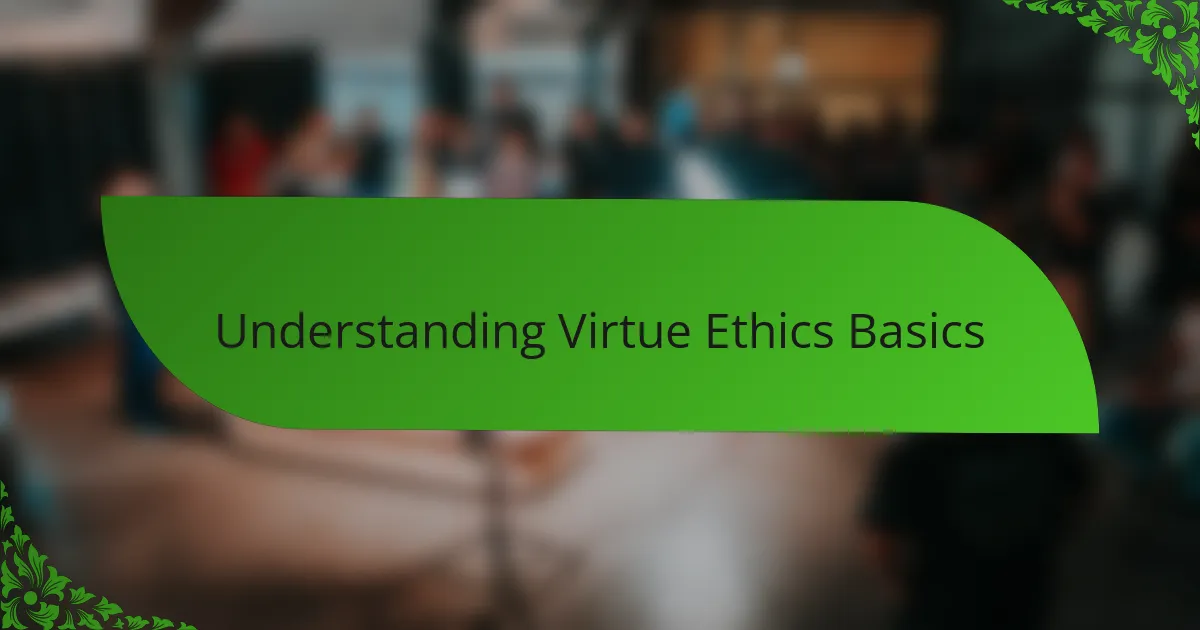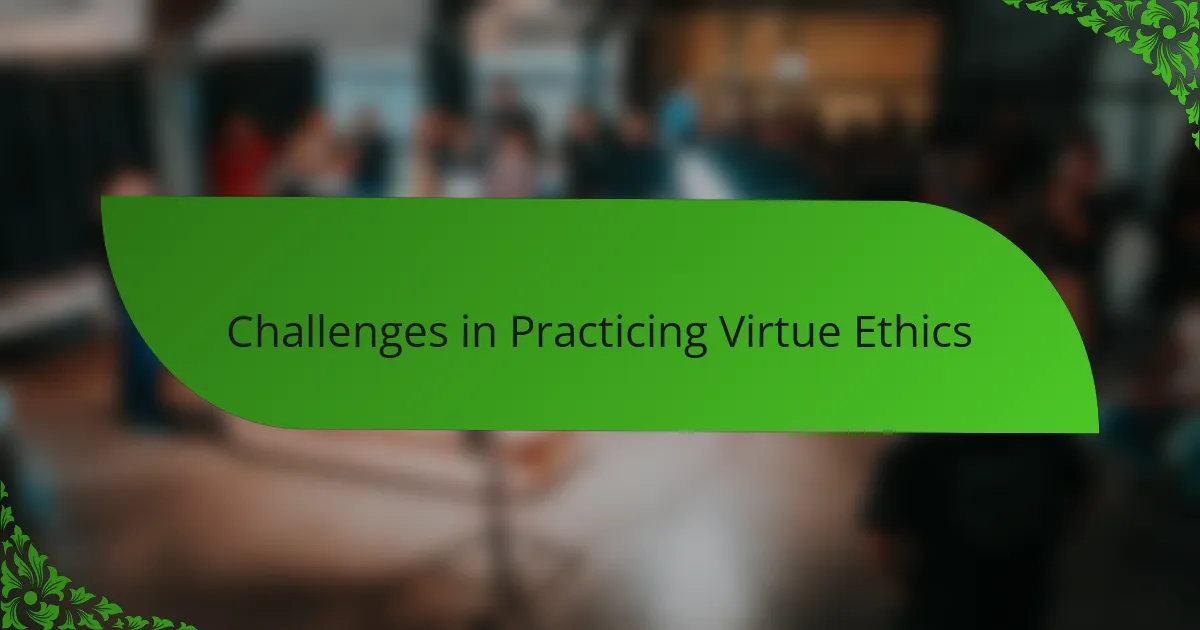Key takeaways
- Virtue ethics emphasizes the importance of character development, focusing on qualities like courage and honesty rather than just following rules or seeking outcomes.
- Consistent practice of virtues fosters trust and collaboration within teams, creating a strong foundation for effective leadership.
- Embracing imperfections and viewing mistakes as growth opportunities lead to more resilient and authentic leadership.
- Being reflective about personal values helps leaders navigate challenges and encourages a more compassionate approach to decision-making.

Understanding Virtue Ethics Basics
Virtue ethics centers on the character of a person rather than just the rules they follow or the consequences of their actions. It made me rethink leadership—not as a checklist of tasks but as a development of qualities like courage, honesty, and compassion. Have you ever noticed how the best leaders you admire seem to possess an inner moral compass guiding their decisions?
When I first encountered virtue ethics, I was struck by its focus on becoming a good person rather than simply doing good deeds. This shift felt almost liberating, like leadership was less about pressure and more about nurturing the right habits over time. It brought a new layer of meaning to everyday choices, reminding me that leadership is deeply personal.
But what truly stuck with me was the idea that virtues are cultivated through practice. No one starts off perfect; it’s about consistently striving to embody traits that align with a moral ideal. I found this perspective both challenging and hopeful—it’s a journey, not a destination. Doesn’t that resonate more with real life than rigid rules do?

Applying Virtue Ethics in Leadership
Putting virtue ethics into practice as a leader has reshaped how I approach tough decisions. Instead of asking, “What’s the rule here?” I pause to reflect, “What would an honest and courageous person do?” This mindset shift feels more authentic, grounding me in values rather than fleeting pressures.
I remember a moment when transparency was difficult—sharing a failure with my team was uncomfortable, but choosing honesty built trust in a way no policy ever could. It made me realize that embodying virtues isn’t just about grand gestures; it’s about those small, consistent actions that shape a leader’s character over time.
Have you ever wrestled with being compassionate while still holding people accountable? Applying virtue ethics taught me that these qualities aren’t opposed but intertwined. Leading with empathy doesn’t mean avoiding tough choices; it means facing them with integrity and respect for those involved.

Benefits of Virtue Ethics for Leaders
One of the biggest benefits I’ve found in embracing virtue ethics as a leader is the sense of inner clarity it brings. When I focus on cultivating virtues like patience and humility, decisions become less about external approval and more about staying true to what feels right deep down. Doesn’t that kind of alignment make leadership feel less like a burden and more like a genuine expression of who you are?
Another advantage is the trust that naturally grows within teams. I’ve noticed when I consistently demonstrate virtues such as honesty and fairness, my team responds with greater openness and collaboration. It’s like virtue ethics creates a foundation, not just for ethical choices, but for stronger relationships that fuel lasting success.
Reflecting on my journey, I also realize that virtue ethics encourages continuous growth, which is incredibly empowering. Instead of fearing mistakes, I now see them as opportunities to practice courage and resilience. Have you ever experienced how embracing your imperfections can actually strengthen your leadership? That mindset shift has been a game-changer for me.

Challenges in Practicing Virtue Ethics
Embracing virtue ethics in leadership hasn’t come without its struggles. Sometimes, it’s tough to know which virtue should take precedence when they seem to conflict—like deciding between being honest and being kind in a delicate situation. Have you ever felt torn between two good qualities, unsure which path truly honors your character?
I’ve also found that cultivating virtues requires patience in a world that often demands quick fixes and immediate results. There were moments when I questioned if my steady efforts to nurture qualities like humility and courage would ever show tangible impact. Yet, I realized that growth in virtue is subtle and slow—something you often only notice in hindsight.
Another challenge is that virtue ethics demands ongoing self-reflection, which can be uncomfortable. Facing my own flaws head-on meant admitting when I fell short of the ideals I aspired to. It’s not easy to stay committed to personal growth when the mirror reveals more work than progress. But isn’t that honesty with ourselves the very foundation for authentic leadership?

Personal Insights on Virtue Ethics
I’ve realized that virtue ethics feels less like a rulebook and more like a mirror, reflecting who I am beneath the surface. It’s humbling and sometimes uncomfortable to face the gaps between the virtues I want to embody and the person I actually am. Have you ever caught yourself wondering if you’re living up to your own moral standards? I certainly have, and that moment of introspection feels both challenging and deeply human.
What stands out most to me is how virtue ethics encourages patience—not just with others but with myself. Leadership isn’t about instant perfection; it’s a gradual unfolding of character through everyday choices. This perspective has helped me be kinder to myself when I stumble, viewing setbacks as stepping stones rather than failures. Doesn’t that make the whole journey feel more sustainable?
At times, I find that virtues like courage and humility pull me in different directions, creating an internal dialogue about what integrity really means. Navigating these tensions has made me realize that leadership is never black and white; it’s an ongoing conversation with oneself. How often do we pause to listen to that internal voice before making a choice? This reflective practice, I’ve learned, is where genuine growth happens.

Lessons Learned from Leadership Experience
One lesson that really stuck with me is how virtue ethics taught me the importance of consistency in leadership. I used to think that a single ethical decision was enough to prove my character, but I’ve learned it’s the small, everyday actions—those moments when no one’s watching—that truly shape who you are as a leader. Have you noticed how those little choices accumulate to define your reputation more than any big speech or bold decision?
Another insight came from realizing that leadership grounded in virtues often calls for balancing competing values. I remember facing a situation where being transparent with my team meant revealing my own uncertainties. It felt risky, but embracing humility in that moment not only strengthened our trust but also deepened my confidence as a leader. Doesn’t that challenge seem counterintuitive yet incredibly rewarding?
Finally, I’ve come to appreciate how embracing virtue ethics transforms leadership into a personal journey rather than a fixed position. Mistakes don’t feel like failures anymore but opportunities to practice resilience and self-improvement. How liberating is it to lead with this mindset, where growth matters more than perfection? For me, this shift brought freedom and a renewed sense of purpose in every leadership challenge.

Improving Leadership with Virtue Ethics
When I started integrating virtue ethics into my leadership style, I noticed an immediate shift in how I handled conflicts. Instead of defaulting to policies or outcomes, I focused on embodying virtues like fairness and patience, which helped me approach challenges with a clearer, calmer mindset. Have you ever found that when you lead from your values, difficult conversations feel less like battles and more like opportunities for growth?
What struck me most is how virtue ethics encourages leaders to model the behavior they wish to see. It’s not about enforcing rules but about living out qualities like honesty and courage consistently, even when it’s uncomfortable. I recall a time when admitting a mistake publicly felt risky, yet that act of humility actually earned more respect than if I had tried to cover it up. Isn’t it fascinating how vulnerability can strengthen your leadership?
Finally, embracing virtue ethics has taught me the power of continuous self-improvement. Leadership isn’t about arriving at perfection but about striving each day to be a better version of yourself. When I started seeing leadership through this lens, setbacks became less discouraging and more like lessons in patience and resilience. Have you noticed how that perspective makes the whole leadership journey feel more meaningful and sustainable?